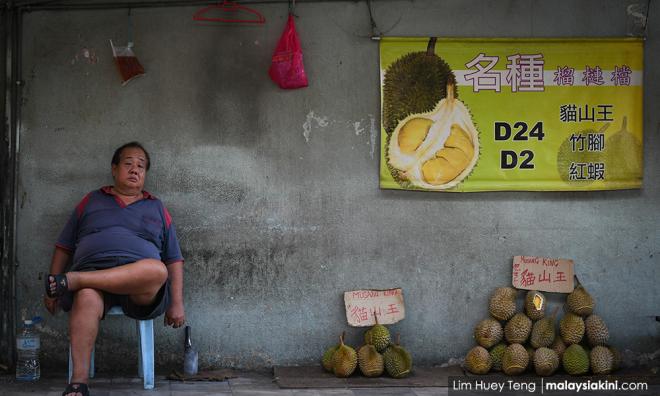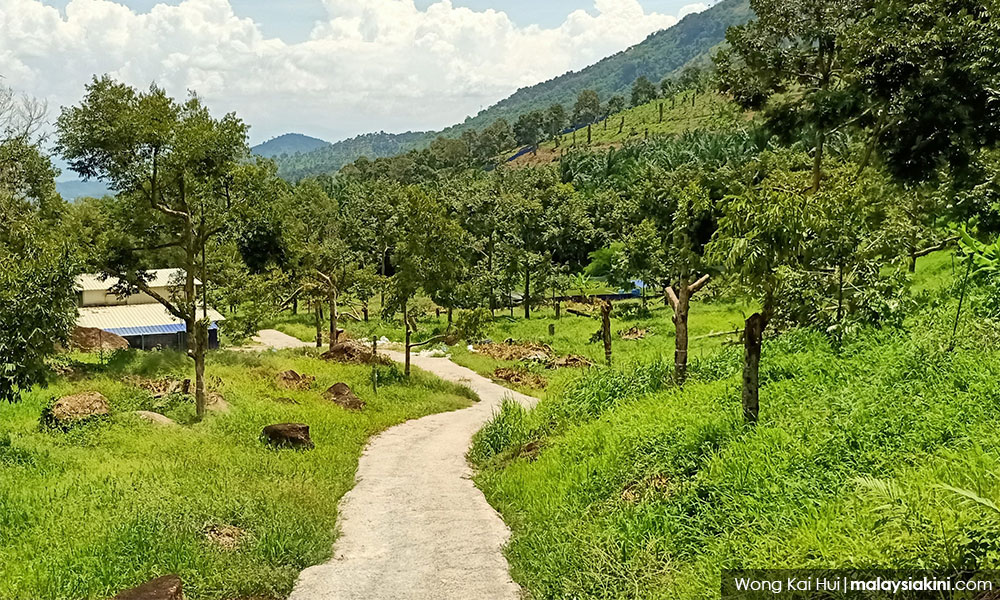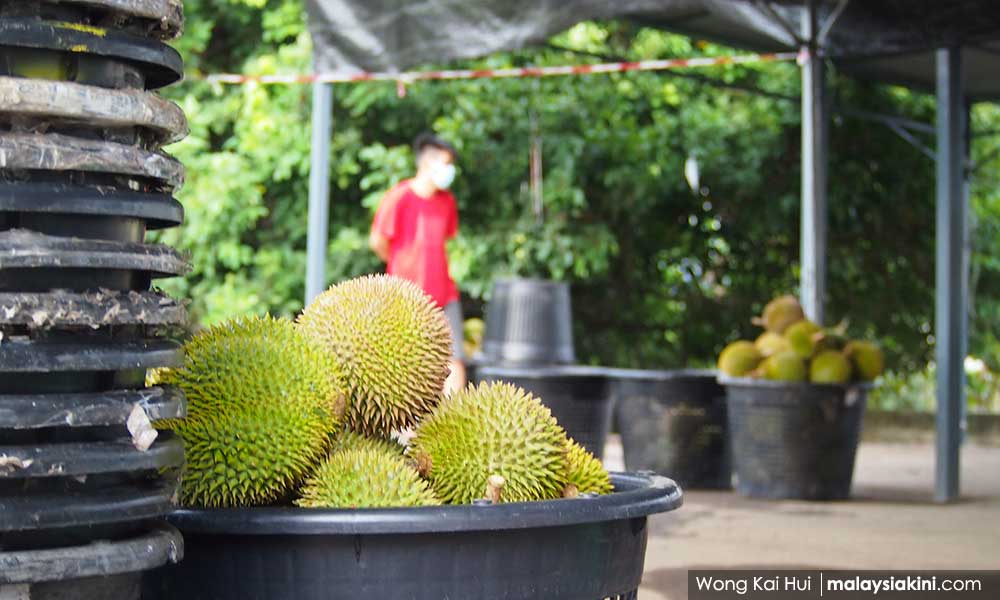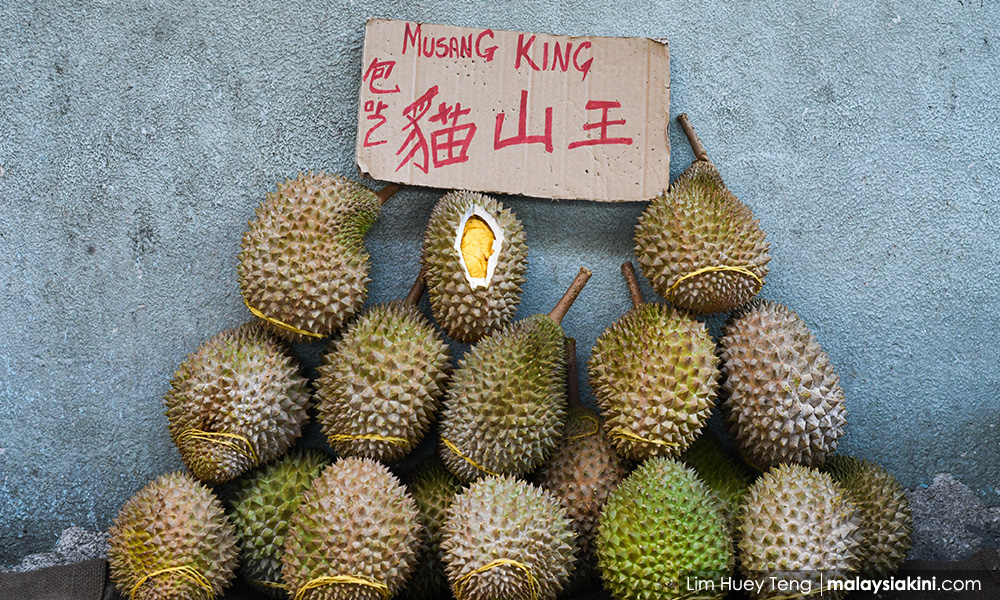
Musang King is the unfinished story of the real Malaysia
by Mariam Mokhtar
COMMENT | The latest shambolic mess in Putrajaya is not the real story of Malaysia because the tale that best reflects the true state of the nation is what is happening 100km away in Raub.
The mess in Putrajaya is the consequence of 52 years of manipulating the 4Rs (race, religion, royalty, rasuah) to benefit a small minority; but the story of the Musang King farmers of Raub is a story about “might is right”.
Few people want to speak about this badly kept secret, probably because of the threat of sedition.
The run-ins between the Musang King farmers and the Pahang government are a reflection of how Malaysians have been treated by the authorities. Expand this story on a larger scale and we find many common parallels. Malaysians are bullied by Putrajaya in similar fashion to the state harassment of Musang King farmers.
1. Most importantly, Raub is a perfect illustration of the big boys who harass the small guys. It is about big businesses and the elite muscling in on the little man. The big boys are the joint venture between the Royal Pahang Durian Resources (RPDR) and the state government (PKPP).
2. Did the "big people" break their backs tending the trees? Did they spend years experimenting with the different durian cultivars before finally settling on Musang King? Do they have the patience to wait, on average five years, for a tree to bear its first harvest?

3. Did the "big people" navigate the difficult terrain and clear the undergrowth to plant the saplings, build drainage channels, weed and apply fertiliser to nurture the trees? Did they suffer snake and insect bites, wild boar or endure harsh sun and driving rain?
With the Musang King popularity in mainland China, making it the new gold, the "big people" want to swoop in and steal what is not theirs.
4. Like the durian tree with roots that reach deep underground, the Musang King saga started in the 1970s. The authorities were still fighting the Communist Party of Malaysia (CPM), and Raub was known as a hotbed of communist terrorists.
The authorities urged farmers to report on the activities of the CPM and as an inducement, offered the villagers - both Malay and Chinese - resettlement nearer to Raub. As a sweetener, each farmer was promised two acres of land.
5. Are we not a nation where the state has often reneged on its many promises? The Musang King story is also about betrayal.
The villagers agreed to be resettled, but to this day, not all have been given the title deeds as alleged by 80-year-old Mohamad Ali, who was the village headman in 1979. The offer was made by the then agricultural board, Lembaga Kemajuan Perusahaan Pertanian (LKPP), which is the precursor of the PKPP.
6. Last week, around 18 farmers and Tras assemblyperson Chow Yu Hui were arrested when state officials stopped farmers from harvesting the durians. It transpired that the state had ignored a High Court order which prevented the eviction of the farmers, pending an appeal.

Both the Forestry Department and the Mentri Besar's office claimed that the operation was over the illegal cultivation in a forest reserve and denied that the arrests had anything to do with the ongoing farmer's dispute with RPDR-PKPP.
The MB's office claimed they had acted on their own legal advice and had interpreted the laws as they saw fit. This is just another example of the insufferable arrogance of many of the government departments.
Similarly, isn't this how stealing taxpayer's money was interpreted as a donation by the convicted criminal, Najib Abdul Razak?
7. When the state cannot justify its actions, it will bring in the big guns. When the Pahang state realised that the villagers were united and standing their ground, the state and the inspector-general of police ordered General Operations Force (GOF) personnel to patrol the area, ostensibly to restore order.
These menacing-looking men, clad in army fatigues and armed with automatic weapons, were meant to intimidate the villagers. The farmers are not terrorists but were treated as such.
8. In Raub and throughout the nation, the powerful know who to co-opt to their board of directors to ensure that they will always have the upper hand in securing government contracts.
Remember how Najib tried to pull the wool over our eyes by claiming that the stolen 1MDB money was a donation from an Arab prince. Why not an ordinary Arab? Did it have to be a prince? He knew that some of us are serf-like.
9. In Raub, like the rest of Malaysia, it is who you know with the kebel-ke-atas (the right connections) that works like magic, and opens many doors. With the right people, the impossible, like land grabs, become possible.
For example, in the construction industry, ordinary Ali, Ah Chong and Arumugam, with the best civil engineering degrees, combined decades of experience and a strong work ethic, will not get a look-in when tendering for a government contract. Add the 'right' fourth person, and hey-presto!

10. Pahang MB Wan Rosdy Wan Ismail expressed fears that the Musang King saga may spill over into a racial issue. He has not been paying attention.
The people doing the land grabbing (RPDR-PKPP) comprises Malays and Chinese. The farmers whose lands are seized are both Malay and Chinese. Perhaps, the Musang King saga is more about the nouveaux riches versus farmers.
For decades, the land office gave permission to the farmers to till the land, rather than leave it idle. Despite the farmer's best efforts, their repeated requests to obtain temporary operating licences (TOL), or land deeds, were refused.
Then, in 2019, the People's Republic of China (PRC) developed an insatiable appetite for Musang Kings. Sadly, a few greedy Malaysians saw a way of manipulating the Musang King farmers to make a fast buck.
The farmers resisted the attempts to turn them into "modern-day slaves", and last week, the state destroyed around 200 mature trees, allegedly grown illegally in the forest reserve. This is revenge politics.
The Forestry Department claimed that illegal cultivation had been on-going for over 20 years. Why was the encroachment not nipped in the bud before it could worsen? Similarly, in Putrajaya, dirty tactics, turncoats and money politics were not dealt with promptly decades ago, and this is why Malaysian politics is a mess today.
What happens in Raub is replicated throughout Malaysia. Until we address the problem of the ordinary rakyat being bullied by the big guys, Malaysia will not progress. What happens in Raub and Putrajaya is also a case of the minority lording it over the majority.
So, are we prepared to start talking honestly and banish the divisive abuse of "identity politics"? Few people have the stomach for frank talking, or for doing the right thing for the rakyat.
MARIAM MOKHTAR is a defender of the truth, the admiral-general of the Green Bean Army and president of the Perak Liberation Organisation (PLO). Blog, Twitter.
by Mariam Mokhtar
COMMENT | The latest shambolic mess in Putrajaya is not the real story of Malaysia because the tale that best reflects the true state of the nation is what is happening 100km away in Raub.
The mess in Putrajaya is the consequence of 52 years of manipulating the 4Rs (race, religion, royalty, rasuah) to benefit a small minority; but the story of the Musang King farmers of Raub is a story about “might is right”.
Few people want to speak about this badly kept secret, probably because of the threat of sedition.
The run-ins between the Musang King farmers and the Pahang government are a reflection of how Malaysians have been treated by the authorities. Expand this story on a larger scale and we find many common parallels. Malaysians are bullied by Putrajaya in similar fashion to the state harassment of Musang King farmers.
1. Most importantly, Raub is a perfect illustration of the big boys who harass the small guys. It is about big businesses and the elite muscling in on the little man. The big boys are the joint venture between the Royal Pahang Durian Resources (RPDR) and the state government (PKPP).
2. Did the "big people" break their backs tending the trees? Did they spend years experimenting with the different durian cultivars before finally settling on Musang King? Do they have the patience to wait, on average five years, for a tree to bear its first harvest?

3. Did the "big people" navigate the difficult terrain and clear the undergrowth to plant the saplings, build drainage channels, weed and apply fertiliser to nurture the trees? Did they suffer snake and insect bites, wild boar or endure harsh sun and driving rain?
With the Musang King popularity in mainland China, making it the new gold, the "big people" want to swoop in and steal what is not theirs.
4. Like the durian tree with roots that reach deep underground, the Musang King saga started in the 1970s. The authorities were still fighting the Communist Party of Malaysia (CPM), and Raub was known as a hotbed of communist terrorists.
The authorities urged farmers to report on the activities of the CPM and as an inducement, offered the villagers - both Malay and Chinese - resettlement nearer to Raub. As a sweetener, each farmer was promised two acres of land.
5. Are we not a nation where the state has often reneged on its many promises? The Musang King story is also about betrayal.
The villagers agreed to be resettled, but to this day, not all have been given the title deeds as alleged by 80-year-old Mohamad Ali, who was the village headman in 1979. The offer was made by the then agricultural board, Lembaga Kemajuan Perusahaan Pertanian (LKPP), which is the precursor of the PKPP.
6. Last week, around 18 farmers and Tras assemblyperson Chow Yu Hui were arrested when state officials stopped farmers from harvesting the durians. It transpired that the state had ignored a High Court order which prevented the eviction of the farmers, pending an appeal.

Both the Forestry Department and the Mentri Besar's office claimed that the operation was over the illegal cultivation in a forest reserve and denied that the arrests had anything to do with the ongoing farmer's dispute with RPDR-PKPP.
The MB's office claimed they had acted on their own legal advice and had interpreted the laws as they saw fit. This is just another example of the insufferable arrogance of many of the government departments.
Similarly, isn't this how stealing taxpayer's money was interpreted as a donation by the convicted criminal, Najib Abdul Razak?
7. When the state cannot justify its actions, it will bring in the big guns. When the Pahang state realised that the villagers were united and standing their ground, the state and the inspector-general of police ordered General Operations Force (GOF) personnel to patrol the area, ostensibly to restore order.
These menacing-looking men, clad in army fatigues and armed with automatic weapons, were meant to intimidate the villagers. The farmers are not terrorists but were treated as such.
8. In Raub and throughout the nation, the powerful know who to co-opt to their board of directors to ensure that they will always have the upper hand in securing government contracts.
Remember how Najib tried to pull the wool over our eyes by claiming that the stolen 1MDB money was a donation from an Arab prince. Why not an ordinary Arab? Did it have to be a prince? He knew that some of us are serf-like.
9. In Raub, like the rest of Malaysia, it is who you know with the kebel-ke-atas (the right connections) that works like magic, and opens many doors. With the right people, the impossible, like land grabs, become possible.
For example, in the construction industry, ordinary Ali, Ah Chong and Arumugam, with the best civil engineering degrees, combined decades of experience and a strong work ethic, will not get a look-in when tendering for a government contract. Add the 'right' fourth person, and hey-presto!

10. Pahang MB Wan Rosdy Wan Ismail expressed fears that the Musang King saga may spill over into a racial issue. He has not been paying attention.
The people doing the land grabbing (RPDR-PKPP) comprises Malays and Chinese. The farmers whose lands are seized are both Malay and Chinese. Perhaps, the Musang King saga is more about the nouveaux riches versus farmers.
For decades, the land office gave permission to the farmers to till the land, rather than leave it idle. Despite the farmer's best efforts, their repeated requests to obtain temporary operating licences (TOL), or land deeds, were refused.
Then, in 2019, the People's Republic of China (PRC) developed an insatiable appetite for Musang Kings. Sadly, a few greedy Malaysians saw a way of manipulating the Musang King farmers to make a fast buck.
The farmers resisted the attempts to turn them into "modern-day slaves", and last week, the state destroyed around 200 mature trees, allegedly grown illegally in the forest reserve. This is revenge politics.
The Forestry Department claimed that illegal cultivation had been on-going for over 20 years. Why was the encroachment not nipped in the bud before it could worsen? Similarly, in Putrajaya, dirty tactics, turncoats and money politics were not dealt with promptly decades ago, and this is why Malaysian politics is a mess today.
What happens in Raub is replicated throughout Malaysia. Until we address the problem of the ordinary rakyat being bullied by the big guys, Malaysia will not progress. What happens in Raub and Putrajaya is also a case of the minority lording it over the majority.
So, are we prepared to start talking honestly and banish the divisive abuse of "identity politics"? Few people have the stomach for frank talking, or for doing the right thing for the rakyat.
MARIAM MOKHTAR is a defender of the truth, the admiral-general of the Green Bean Army and president of the Perak Liberation Organisation (PLO). Blog, Twitter.
***
kt notes:
Here's an old story of unbridled greed in the corridors of power and how it was effectively kautim-ed:
***
Friday, March 21, 2008
Boycotts
Now we all know sweetie Helen Ang of Malaysiakini had posted an article on hartal, a call to boycott the mainstream media (MSM) for not only being the BN mouthpieces but also for their extraordinary creativity with facts.
For example, with a stroke of a pen, a crowd of 40,000 could be reported with a missing digit, reducing the staggering movement to only one-tenth of its actual size, implying the rally had been less significant and probably by a ‘lunatic fringe’ group.
Then, decent Hindraf activists could be portrayed as marauding Tamil Tigers from Trincomalee.
Did I heed the sweetie’s call to boycott the MSM? No, I didn’t ;-) not that I don't love her but because knowing what the MSM are, I can confidently factorise their bovine poo into some useable form of garden manure for my mother’s gerbera, gladioli and guava, while enjoying the international news and entertainment pieces.
Besides, it’ll be cruel to punish a host of economic dependents including paper boys (once a million years ago I was one selling the Star) who survive on the sales of the MSM.
While the word hartal is of Hindi origin, the English equivalent boycott originated from Ireland in 1880 – read here for more on boycott.
My uncle told me of the Chinese boycott of Malay goods shortly after the May 13 incident – stuff such as Malay food like fruits, durians, satay, herbs and even the wearing of sarong kebaya. Unfortunately they were hurting innocent traders, with the inevitable resentment growing against what was perceived as Chinese meanness. It was a lose-lose situation.
Another uncle - told a sweetie I have many ;-) – related the story of the mandarin orange boycott.
Many years ago a particular greedy person thought he would exploit the Chinese New Year spending binge on mandarin oranges, so he obtained (through his powerful connections) an import licence giving him sole rights to import the much desired citrus fruits from China and Taiwan.
Story went that he added insult to injury by imposing on retail traders a very high price, obviously to ramp up his expected profits – ‘twas a case of his arrogant ‘take it or leave it’, believing the Chinese just couldn't do without such a culturally vital item at the start of a new Lunar Year.
The Chinese did the unexpected and ‘left it’, forgoing its traditional ‘must have’ mandarin oranges for Chinese New Year. I am of course simplifying the story where prior to the boycott, acrimonious exchanges occurred, which were reported by a once freer press. The Chinese community by then were fairly primed up to take up the very difficult boycott of a once-a-year indispensable item. But they did it!
As the New Year approached, the bloke panicked and started to come down to earth with his price for the fruits. Still, a lesson had to be taught. The retailers continued to boycott him.
And no one bought anything even when he attempted to bypass the normal retailers by setting up his own retail stalls, presumably at some considerable costs.
He was left with thousands and thousands of crates of rapidly over-ripening kam on his by then shaking hands.
There was no relent even when he gave some away as a means of stimulating a return to the purchase of the fruits so that he could recoup his principal when he sold the remaining stock.
In the end he was left with zillions of rotting kam and a huge hole in his pocket. Mind you, those decomposing kams would have made excellent compose for my mum's gerbera, gladioli and guava.
Quite frankly I had agreed with my uncle the greedy bloke deserved being shafted for his attempt to exploit the retail traders. Unlike the unfortunate traders who lost business post May 13, this bloke earned the wrath of the consumers for subverting an open system through misuse of official connections for his avarice.
… which brings us to the current situation in Penang where the Star reported Hindraf coordinator R.S. Thanenthiran appealing to Penangites: Don’t boycott nasi kandar.
It seems that the hartal of nasi kandar came about because of the circulation of an SMS (purportedly from Hindraf) alleging that nasi kandar operators were involved in last Friday’s street protest at Komtar. The SMS even signed off with a cheeky ‘Makkal Sakti’.
Thanenthiran said the SMS was bullsh*t as Hindraf did not issue any such statement.
Unfortunately the boycott has began to bite in because business dropped by 10% to 15%.
I remember not too long ago there was another so-called boycott directed against Muslim restaurants by a Muslim body, calling for Muslims not to imbibe an American fizzy dark coloured drink ;-), because of American yadda yadda yadda. However, the boycott strangely targeted only one American drink but not another – ha ha ha!
Most people guessed it was more commercial sabotage rather than sincere boycott. Now, who‘s the naughty person responsible for the call to boycott nasi kandar? I'll be bloody annoyed if my favourite nasi kandar man in front of Mesjid Kapitan Kling has been affected.
There is an amount of truth in that the Nasi Kandar owners who are overwhelmingly from "a certain community" are very much supportive of elements of the said Community who are notorious troublemakers in Penang, especially after DAP took over the Penang State administration.
ReplyDeleteIf the Agong is truly a king for the rakyat, he would intervene and ensure the farmers are treated fairly.
ReplyDeleteHowever, what I see is the powerful being very offended that puny farmers dared challenge them. To think they had to call in the elite police says a lot about the evil intentions of the powerful elites in wanting to intimidate the poor farmers.
The Agong's daughter is the Chairperson of Royal Pahang Durian, the firm that is behind the move to takeover the State land.
DeleteJust to show you it's not a racial issue, the other key players behind Royal Pahang Durian are Chinese Malaysians (proven), and rumoured Chinese from "other lands".
I don't think anyone has said this is a racial issue.
DeleteWhat we can see are:
1) conflict of interest or corruption when the royalty is involved in the business
2) the powerful bullying the weak
And I must conclude, the Agong risks the erosion of his moral authority since his family is directly involved in the dispute by way of his daughter being chairperson of Royal Pahang Durian.